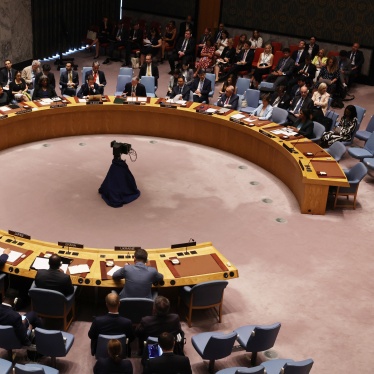(New York) – The United Nations Security Council should require more vigorous civilian protection and better human rights reporting when it renews the mandate of the Darfur peacekeeping mission in June 2015. On June 10, the UN Assistant Secretary-General for Peacekeeping Operations Edmond Mulet briefed the Security Council and relayed the Secretary-General’s recommendation to renew the African Union/United Nations Hybrid Mission in Darfur (UNAMID) for 12 months. Sudan is pressing for a drawdown of UMAMID.
At least 500,000 people have been displaced by fighting in Darfur over the past 16 months, according to UN statistics, due to the surging conflict, violent attacks on civilians, indiscriminate bombing, and widespread abuses by Sudanese government forces and allied militia. The scale of displacement is comparable to what it was at the peak of the conflict in 2003-2005, and underscores the urgent need for the Security Council to reinvigorate the hybrid mission’s role in protecting civilians, Human Rights Watch said.
“Darfur’s downward spiral means that hundreds of thousands of civilians urgently need protection,” said Daniel Bekele, Africa director at Human Rights Watch. “Any UNAMID downsizing risks being harmful to civilians unless it is balanced by stronger civilian protection and robust human rights reporting.”
The Security Council is scheduled to vote on the future of UNAMID on June 24; the mission’s mandate expires on June 30. Council members will continue to debate UNAMID’s downsizing this month. The debate comes after Sudan demanded that the mission withdraw, shut down its human rights liaison office in Sudan’s capital, Khartoum, and expelled top UN staff in December 2014.
UNAMID was established in 2007 to protect civilians from violence in Darfur, but has experienced serious problems, in large part because of the Sudan government’s restrictions on its movement, as well as attacks on its personnel. Peacekeepers have not been allowed meaningful access to the embattled Jebel Mara area in Central Darfur for five years. The mission also has a mandate to report on human rights abuses but has continually failed to produce sufficient public reporting.
Since February 2014 Human Rights Watch and other organizations have documented a sharp increase in the scale and gravity of laws-of-war violations in Darfur. Abuses have included the destruction and burning of villages, rampant sexual violence against women and girls, and massive forced displacement of civilians.
In February 2015, Human Rights Watch documented the mass rape of up to 221 women and girls by Sudanese forces during a 36-hour period in late October and early November 2014 in the town of Tabit, North Darfur. The government has denied UNAMID access to Tabit to carry out a credible investigation. In May 2015, Rashida Manjoo, the UN special rapporteur on violence against women, called on the government of Sudan to establish a commission of inquiry “to look into the reports of allegations of mass rapes in different regions, including recent allegations regarding the village of Tabit.”
Between February and April 2014, the government’s Rapid Support Forces (RSF) burned scores of villages across much of South and North Darfur. The RSF is under the command of Sudan’s National Intelligence and Security Service (NISS) and is led by a notorious former militia commander, General Mohammed Hamdan “Hemmeti” Dongolo. RSF forces continued to attack civilians in 2015 in Jebel Mara. Tens of thousands of residents of Jebel Mara have been displaced to areas where they lack adequate food, water, and shelter. The Sudanese government has denied UNAMID and all aid agencies access to the affected areas in Jebel Mara. The rainy season usually begins in June and is often a lean period as people await the harvest. Displaced people with no access to aid may face serious food shortages, and the Sudanese government should immediately allow access for independent aid agencies to the displaced communities, Human Rights Watch said.
The Security Council should call upon Sudan to allow UNAMID unfettered access to all conflict-affected locations, Human Rights Watch said. UNAMID should establish new temporary operating bases in both government-controlled and rebel-controlled areas where it now has little or no presence, including Jebel Mara and East Jebel Mara. The Security Council should impose travel bans and asset freezes on individuals responsible for the continued obstruction of peacekeepers.
“Civilians in Jebel Mara and other parts of Darfur are as vulnerable to serious abuses as they were 12 years ago when Darfur was on the global agenda,” Bekele said. “Improving UNAMID will not be easy, but it won’t happen unless the Security Council stands up to Khartoum’s bullying and reconfigures the mission with the protection of civilians as a top priority.”





